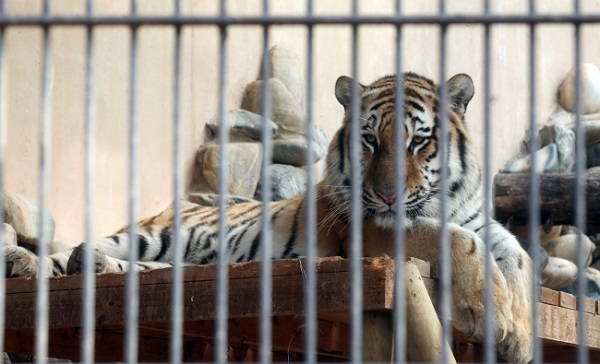A group of Siberian tigers currently exhibited at a local zoo in Gwacheon, Gyeonggi Province, will be transferred to a government-owned arboretum this summer, according to the Ministry of Agriculture, Food and Rural Affairs on Wednesday.
Selected tigers at the Seoul Zoo will be relocated to a 48,000-square-meter forest designed to simulate a wild tiger habitat. The area, called “Tiger Forest,” is part of the ministry’s 220.1 billion won ($192.4 million) project to build Asia’s largest arboretum in North Gyeongsang Province, set to officially open to the public this year.
 |
A Siberian tiger residing at Seoul Zoo in Gwacheon Province stares out from a cage. (Yonhap) |
The government plans to pick two or three tigers, including at least one female, for the move, but the exact number, male-to-female ratio and their moving-out date has yet to be announced.
A series of medical tests will be conducted on tigers within the zoo to select a healthy batch for the project. The procedure includes a blood test run by animal experts, along with in-depth screening.
The supervisors of the process are being extra cautious with the medical test after controversy that followed the death of a male tiger relocated to the reserve from a zoo in Daejeon in April. According to a government report, the animal suffered from a chronic disease that developed into uremia due to the stress of the relocation process three months prior to its death.
During the transfer the tigers will be provided a car designed to respect their highly sensitive nature. Temperature and humidity will be controlled inside the cage and the car will travel at a speed of 70 kilometers per hour.
After arriving at the forest, the tigers will be given an adjustment period of two to three months and released by the time of the official arboretum’s opening, scheduled to be in either September or October.
Safety fences will be installed around the forest for public viewing.
Siberian tigers are considered extinct in South Korea, with the last sighting dating back to 1921 in the mountains of North Gyeongsang Province. Currently, some 50 of its kind, mostly donated or brought in from China or Russia, reside in local zoos in South Korea.
By Jung Min-kyung (
mkjung@heraldcorp.com)








